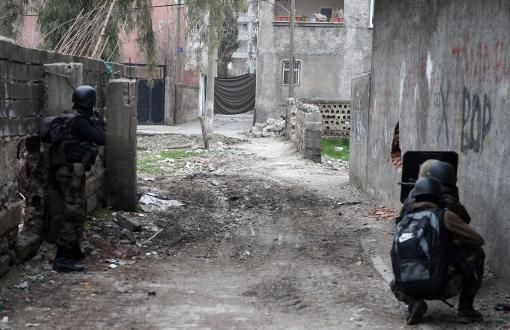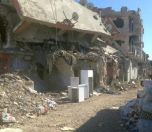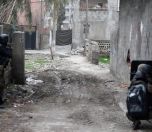* Photo: Anadolu Agency (AA) - Archive
Click to read the article in Turkish
The Constitutional Court will examine the application regarding the people who were killed in the basements of two buildings in Cizre in Turkey's Kurdish-majority southeastern province of Şırnak during the period of curfews in 2015-2016. The examination will take place on April 21.
Announcing the development on his social media account, lawyer Ramazan Demir has shared the following information by the top court:
"The application is regarding the allegations that the right to personal liberty and security was violated as the curfew imposed by the administrative authorities was not lawful; that the right to life was violated due to the injuries that occurred as a result of unjust and disproportionate use of force by security forces, injured people being held in places where they were in an injured and exhausted manner until they died, these people not allowed to access healthcare services, the effects of the developments on the mental states of the relatives of the related people, the eventual death of the injured, the inability of their relatives to access their deceased bodies, the failure to conduct an effective investigation into the mentioned incidents, the creation of a state of impunity for the public officers who used force, and the misuse of human rights and freedoms by the state; and that the prohibitions as to maltreatment and misuse of fundamental rights and freedoms were violated."
What happened in Cizre?While the curfew declared in the district of Cizre in Turkey's southeastern province of Şırnak on December 14, 2015 was still in effect, Minister of Interior of the time Efkan Ala announced on February 11, 2016 that the operations of blockade were ended. However, the curfew in Cizre was rearranged in a way to be in force at nights as of March 2, 2016 and entry to/ exit from the district was prohibited until March 2, 2016. After the curfew was lifted in the neighborhoods of Cudi and Sur in Cizre, 177 dead bodies, 25 of which belonged to children, were found in the wreckages and debris of mainly 3 buildings and the houses in their vicinity. While the 103 of the deceased could be identified, 74 people were put to rest without being identified. The total number of the dead has been announced as 189. According to the report of the Peoples' Democratic Party (HDP), almost all of the dead bodies were beyond recognition because they were either burned or decomposed. The remnants of human bones and military ammunition were found in the basements. Forensic Experts also found remnants of human bones of children in the basements. |
Judicial process: ECtHR to await top court
The European Court of Human Rİghts (ECtHR) pronounced its judgement on Orhan Tunç, one of the 189 people from Cizre, Şırnak who lost their lives in the operations launched in the region five years ago.
Announcing its verdict on Tunç, who died in the basement where he took refuge after being wounded, the ECtHR found the application "inadmissible" since "all domestic remedies have not been exhausted."
In its judgement dated February 7, 2019, the court said that there were "special circumstances of the case and the period"; but, it added that those circumstances "did not exempt them from the requirement to make use of remedy of an individual application to the Constitutional Court."
Speaking to bianet about the judgement of the ECtHR, Benan Molu, one of the attorneys following the case, stated, "The court has openly stated that an effective investigation has not been conducted into the death of Orhan Tunç and the process of an administrative suit is not an effective way."
Regarding the related part of the judgement, Benan Molu said, "We are aware of the allegations of applicants and international organizations; however, at this point, we cannot disregard it."
Referring to the Article 131 of the ECtHR judgement, Molu has emphasized that the legal process regarding the violation of rights committed during curfews in Cizre has not been exhausted yet.
The Article 131 of the judgement was as follows:
"The above findings do not prevent the applicants from lodging a new application before the Court in the event of any subsequent developments that may cast doubt on the effectiveness of the remedy of an individual application to the Constitutional Court, for example if the examination of their applications by that court is unduly prolonged, or if the Constitutional Court fails to examine their complaints in a manner that satisfies the requirements of Article 2 of the Convention."
Reminding that there were two case files regarding Orhan Tunç awaiting the judgement from the Constitutional Court, Molu stated:
"The remedies have not been exhausted. The ECtHR says the following: If the Constitutional Court does not announce its ruling on the related cases or gives a ruling that would contradict the established legal precedents, another application can be made to the ECtHR."
Cizre in international reportsThe reports issued by several international institutions and organizations as well as the United Nations (UN), European Parliament, Parliamentary Assembly of the Council of Europe (PACE) and the European Court of Human Rights (ECtHR) have revealed the unlawfulness that unfolded in the region during the period of curfews: "The Opinion on the Legal Framework Governing Curfews report released by the Venice Commission of the Council of Europe on June 13, 2016 concluded that 'serious violations of human rights occurred, fundamental rights and freedoms were suspended and the curfews were not based on the Constitutional and legislative framework.' "The report which was prepared by a commission chaired by UN High Commissioner for Human Rights Zaid Raad al Hussein on March 10, 2017 also indicated that 'nearly 2,000 people lost their lives during the operations that continued for 18 months in this period.'" |
(AS/SD)








